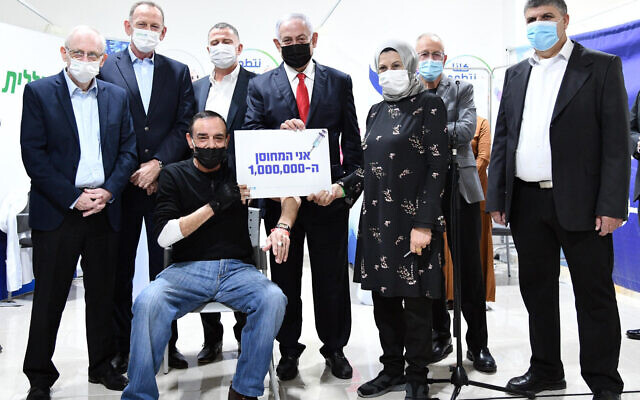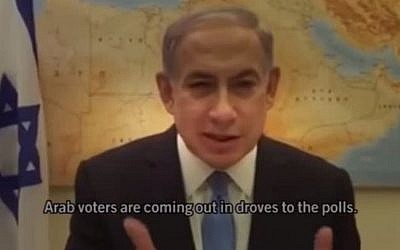Following a number of high-profile visits to Arab Israeli towns last week and reports that his Likud party is planning to campaign heavily for Arab votes in the coming election, Prime Minister Benjamin Netanyahu said Saturday that he hopes Arab Israelis will cast a ballot for him.
“Just as I broke the Palestinian veto on relations with the Arab states, so I am breaking the Arab parties’ veto with the Arab citizens of Israel,” he told the Likud party secretariat, according Hebrew media reports. He was referring to the four normalization deals Israel has announced with Arab countries in recent months.
“I believe in [Zionist leader Ze’ev] Jabotinsky’s doctrine that all rights need to be given to every citizen in the State of Israel. We’re reaching out to Arab voters — vote for us.
“I’ll sit tomorrow with [Public Security] Minister Ohana to bring [about] a plan against crime and violence in Arab society,” Netanyahu was quoted saying by the Walla news site. Arab communities have long accused the government of neglect in the face of rising murder rates.
The new messaging marks a shift in tone by Netanyahu, whose Likud has campaigned in the past on unfounded claims of electoral fraud in Arab communities. He has repeatedly demonized Arab lawmakers in the Knesset and gained global notoriety for attempting to spur his supporters to go vote by warning them on election day 2015 that “Arab voters are heading to the polling stations in droves.”

Prime Minister Benjamin Netanyahu (C) with the millionth Israeli to get a COVID-19 vaccine and medical staff in Umm al-Fahm, January 1, 2021. (Haim Zach/GPO)
“I’m not moved by the criticism about this. We’re not reaching out to politicians but to the public,” he said, according to the Kan public broadcaster.
A number of Netanyahu’s political rivals hit out at the prime minister following the leaks of his comments to the Likud secretariat.
Joint List leader Ayman Odeh accused Netanyahu of insulting Arab voters’ intelligence.
“We already knew that Netanyahu doesn’t believe we’re equal, but his new effort to garner votes also proves that he disparages the intelligence of Arab society. A decade of indifference to crime, inciting violence, fanning hate won’t be erased in an election campaign,” Odeh tweeted.
Arab Israelis have long complained of a tide of violent crime in their communities. 2020 saw 96 homicides in the Arab population, representing a 50 percent jump in the murder rate among Arab Israelis in only four years.
Arab parliamentarians and civil society organizations have repeatedly decried the plague of violence in their communities and accused Israeli authorities of failing to stem the tide.

Joint List MK Mansour Abbas in an interview on DemocratTV, October 27, 2020. (Twitter screen capture)
Taking the opposite tack to his party leader, Joint List MK and Ra’am faction leader Mansour Abbas — whom Netanyahu appears to have formed a quiet alliance with in recent months — welcomed the “change in perception” toward Arab Israeli voters, but suggested Netanyahu look elsewhere.
“I was happy to identify first and lead the change in the perception of politicians on the Israeli right toward Arab society — from a hostile attitude toward the Arab citizens of the country to the attitude that places them at the center of political discourse,” Abbas tweeted.
He added, however: “We, the sons and faces of Arab society who represent it with dignity, recommend that you look for votes in Hadera and not in Umm al-Fahm,” he said, naming Jewish Israeli and Arab Israeli towns.
“After years of neglect and inaction, the prime minister remembered tonight to talk about formulating a plan to eradicate crime in Arab society,” New Hope chief and former Likud MK Gideon Sa’ar tweeted. “It is unfortunate that to this day the issue has not interested him, and that only recently, his government prevented the passing of a bill introduced to enforce minimum penalties for illegal arms holders and traffickers.”
Opposition Leader Yair Lapid shared the video clip of Netanyahu’s “Arab voters… in droves” comments alongside an “Arabic idiom” that he wrote in both Hebrew and Arabic.
“If you’re a liar, think carefully before you lie. If you’re a liar, you need to have a good memory, so they won’t expose your lie,” Lapid, who heads the Yesh Atid-Telem party, wrote on Twitter.
Hoping to break the traditional paradigm in elections that has led to gridlock and paralysis after three consecutive elections, Netanyahu told Channel 13 on Friday that the Arab vote had “huge potential.”
“For many, many years the Arab public was outside the mainstream of leadership. Why?” he said. “There’s no reason. People contribute, people work. Let’s go all the way. Be part of the full success story of Israel. That’s what I would like to be exemplified in the election.”
Recent opinion polls have shown Netanyahu’s Likud ahead of its rivals as Israel heads to a new election in March, but without a clear path to forming a coalition, signaling the potential for ongoing political gridlock as the country holds its fourth election in two years.
Elections were called last month after the power-sharing government of Likud and Blue and White failed to agree on a budget by a December 23 deadline. They are set to take place on March 23, 2021.
Related posts:
Views: 0
 RSS Feed
RSS Feed

















 January 3rd, 2021
January 3rd, 2021  Awake Goy
Awake Goy 
 Posted in
Posted in  Tags:
Tags: 
















